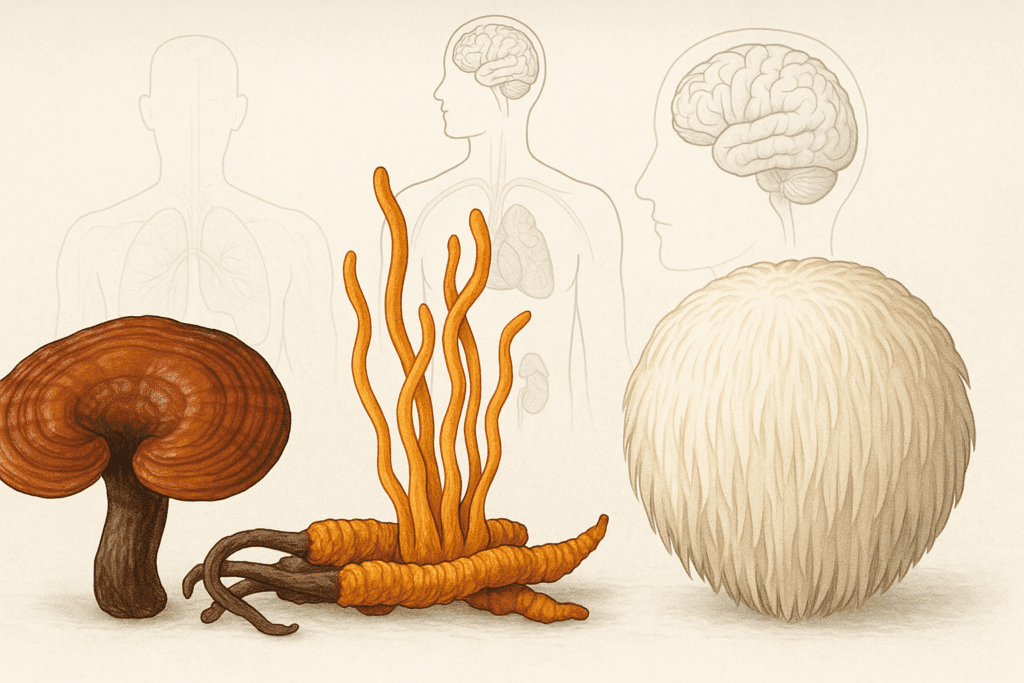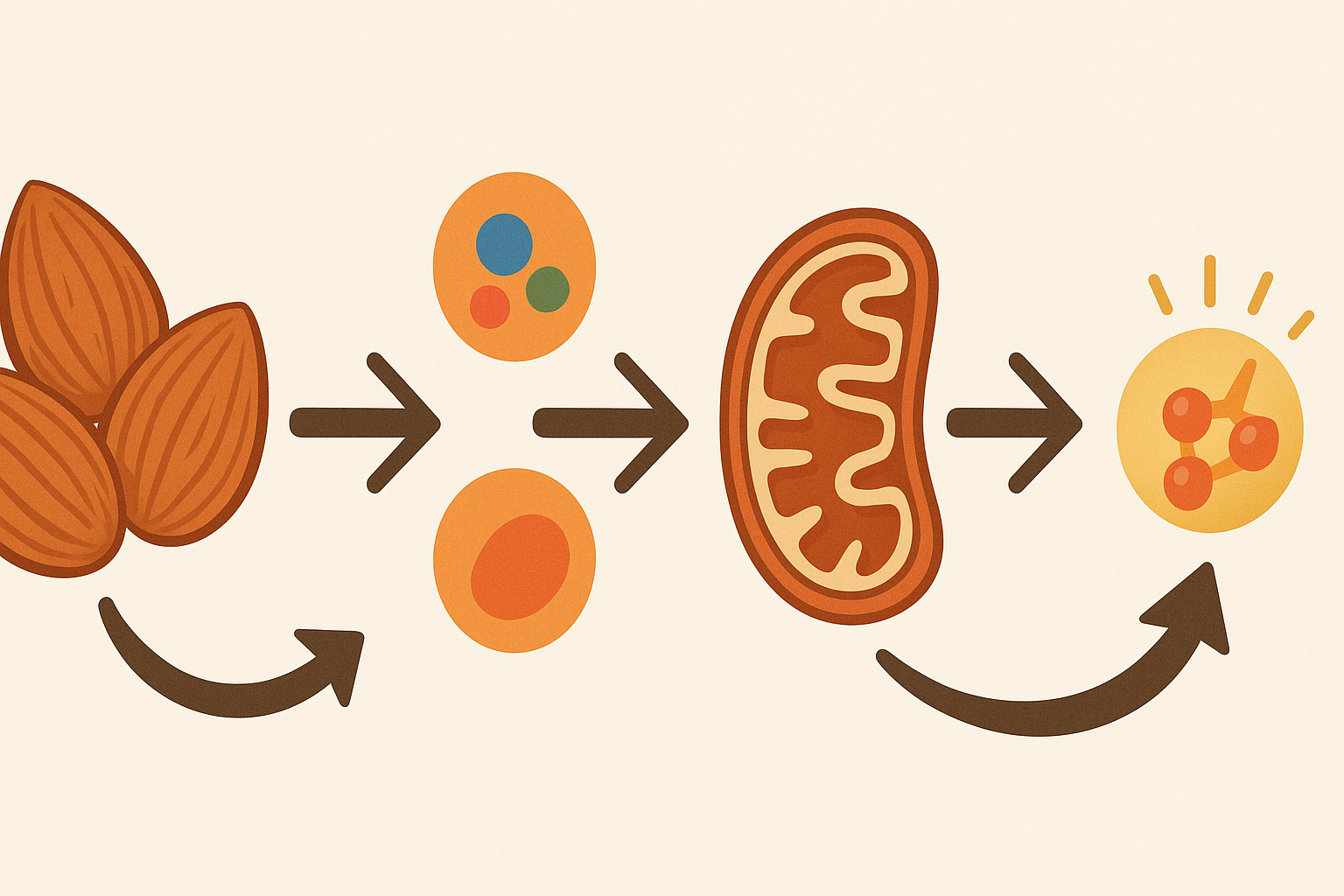In an era defined by chronic fatigue, overwhelming workloads, and a never-ending digital feed, the quest for sustained energy and stress relief has become more vital than ever. While synthetic stimulants and processed supplements often promise quick fixes, many people are now turning to holistic, natural alternatives that work with the body rather than against it. Among the growing field of natural remedies, two powerful food-based interventions have emerged as front-runners: adaptogenic mushrooms and almonds. A critical question has surfaced amid this nutritional renaissance: do almonds give you energy? As we explore this inquiry, it becomes apparent that both adaptogenic mushrooms and almonds play vital, complementary roles in supporting not only energy levels but also overall resilience to stress.
You may also like: Unlock Powerful Stress-Relief with Adaptogenic Mushrooms and Stamina Herbal Support

The Modern Energy Crisis: Why Natural Solutions Matter
Millions of adults today report feeling constantly tired, even after a full night’s rest. This phenomenon is no longer confined to those with known medical conditions—it has infiltrated mainstream culture as a normalized experience. One of the key contributors to this persistent fatigue is the overreliance on refined sugars, caffeinated beverages, and highly processed foods that offer temporary stimulation without true nourishment. The energy they provide is fleeting and often followed by a crash that leaves people even more drained than before.
In this context, the demand for food-based interventions with both energizing and restorative properties has surged. Unlike quick fixes, whole foods like almonds and functional mushrooms offer a more stable, long-lasting solution. These nutrient-dense options don’t just fill a gap—they help recalibrate the body’s internal systems, promoting more balanced energy metabolism and stress hormone regulation.

Understanding Adaptogens: The Science Behind Stress Support
Adaptogens are naturally occurring substances, primarily found in plants and fungi, that help the body adapt to various forms of stress—be it physical, emotional, or environmental. Rather than targeting a single system, adaptogens exert a regulatory influence on multiple physiological processes, particularly those governed by the adrenal glands and the hypothalamic-pituitary-adrenal (HPA) axis. This allows them to enhance the body’s resilience to stressors without overstimulating the nervous system.
Popular adaptogenic mushrooms like Reishi, Cordyceps, and Lion’s Mane each bring unique benefits to the table. Reishi is often celebrated for its calming properties, helping to lower cortisol levels and support restorative sleep. Cordyceps, by contrast, is known to boost stamina and physical endurance by improving the body’s utilization of oxygen. Lion’s Mane has attracted significant interest for its neuroprotective qualities and potential cognitive-enhancing effects. Together, these fungi provide a dynamic toolkit for stress management and energy optimization.
How Adaptogenic Mushrooms Regulate Energy Without the Crash
One of the most compelling aspects of adaptogenic mushrooms is their ability to support energy without the jittery side effects commonly associated with stimulants. For instance, Cordyceps has been shown to improve mitochondrial function, which is central to the production of adenosine triphosphate (ATP)—the body’s primary energy molecule. By enhancing the efficiency of cellular respiration, Cordyceps helps the body generate energy more sustainably.
Reishi and Lion’s Mane, though less directly linked to physical stamina, play important roles in sustaining mental energy and emotional resilience. Reishi reduces systemic inflammation and modulates immune function, both of which can drain energy when left unchecked. Lion’s Mane supports neurogenesis and cognitive clarity, helping individuals stay focused and motivated. The synergistic effects of these mushrooms allow for a more comprehensive form of energy support that encompasses both body and mind.

Do Almonds Give You Energy? Exploring the Nutritional Foundation
This question—do almonds give you energy—is not merely rhetorical; it strikes at the heart of nutritional science. Almonds are an exceptional source of macronutrients and micronutrients essential for sustained energy production. They are rich in healthy monounsaturated fats, plant-based protein, and complex carbohydrates, all of which contribute to stable blood sugar levels and prolonged satiety.
Almonds are also loaded with micronutrients like magnesium, a mineral critical for ATP synthesis and muscle function. A magnesium deficiency can manifest as fatigue, muscle weakness, and poor concentration—symptoms that often go unnoticed or are misattributed to other causes. Additionally, almonds provide vitamin E, riboflavin (B2), and niacin (B3), all of which are involved in metabolic processes that convert food into usable energy.
Beyond their nutritional profile, almonds offer practical advantages as a portable, shelf-stable snack. Their convenience makes it easier for individuals to make healthier choices, especially during periods of stress or high demand when the temptation to reach for sugary, processed snacks is strongest.
The Role of Almonds in Glycemic Control and Energy Stability
One of the often-overlooked aspects of energy management is the role of blood sugar stability. Foods that cause rapid spikes and crashes in glucose levels are major culprits behind mid-day fatigue, irritability, and impaired cognitive function. Almonds, with their combination of healthy fats, protein, and fiber, have a low glycemic index. This means they release glucose into the bloodstream gradually, helping to maintain consistent energy levels throughout the day.
Several studies have demonstrated that consuming almonds with high-carbohydrate meals can moderate postprandial glycemic responses. This makes them particularly valuable for individuals with insulin resistance, prediabetes, or type 2 diabetes—conditions commonly associated with chronic fatigue. The stabilizing effect of almonds on blood sugar also reduces the likelihood of stress-induced eating, further supporting emotional well-being.

Cognitive Benefits: How Almonds and Lion’s Mane Enhance Mental Clarity
Mental energy is as critical as physical stamina, especially in an age where knowledge work dominates the professional landscape. Here, the combination of almonds and Lion’s Mane mushrooms presents an especially promising synergy. While almonds supply B vitamins and essential fatty acids required for optimal brain function, Lion’s Mane supports the synthesis of nerve growth factor (NGF), a protein vital for the growth, maintenance, and survival of neurons.
Emerging research suggests that this dual nutritional approach may help improve memory, attention span, and problem-solving skills. The antioxidant properties of almonds further protect the brain from oxidative stress, which is increasingly linked to cognitive decline. By pairing these two ingredients, individuals can enhance both the structural and functional integrity of the brain, promoting greater focus and emotional resilience.
Stress Resilience and Adrenal Health: The Cortisol Connection
Chronic stress exerts a profound toll on the body’s adrenal glands, which are responsible for producing cortisol and other stress hormones. Over time, excessive cortisol output can lead to a range of adverse outcomes, including insomnia, fatigue, weight gain, and immune suppression. Adaptogenic mushrooms like Reishi help normalize cortisol levels, allowing the body to maintain homeostasis even in challenging conditions.
Almonds indirectly support adrenal health by supplying magnesium and B vitamins, both of which are depleted under stress. These nutrients are essential for the enzymatic processes that govern hormone synthesis and nervous system function. By replenishing these key building blocks, almonds help the body recover more effectively from stress, thereby conserving energy for essential functions.
Combining Adaptogenic Mushrooms and Almonds for Holistic Energy Support
The integration of adaptogenic mushrooms and almonds into a daily wellness routine offers a comprehensive strategy for managing both stress and fatigue. Rather than relying on isolated compounds or synthetic stimulants, this approach leverages whole-food synergies to support the body’s natural resilience mechanisms. For instance, a smoothie incorporating almond butter, Cordyceps powder, and a banana can provide both immediate fuel and longer-term endurance. Likewise, a trail mix with raw almonds, dried goji berries, and Reishi mushroom powder offers a balanced blend of nutrients for energy and immune support.
This combination also appeals to a wide range of dietary preferences, including plant-based, gluten-free, and paleo lifestyles. As interest in functional nutrition continues to grow, the pairing of almonds and adaptogenic mushrooms represents an accessible yet sophisticated strategy for enhancing everyday vitality.

Do Almonds Give You Energy? Understanding Their Role in Mitochondrial Function
To answer the question “do almonds give you energy” at a cellular level, it’s important to examine the role of mitochondria—the energy-producing organelles found in every cell. The nutrients found in almonds, particularly magnesium and B vitamins, play critical roles in mitochondrial respiration. Magnesium acts as a cofactor for the enzymes involved in ATP production, while B2 and B3 are precursors for flavin adenine dinucleotide (FAD) and nicotinamide adenine dinucleotide (NAD+), both essential in electron transport chains.
A well-functioning mitochondrial system results in more efficient energy production, less oxidative stress, and improved physical and mental performance. Almonds, by supplying these foundational nutrients, act as a form of nutritional therapy for supporting mitochondrial health. This adds a deeper layer of credibility to their role as a natural energy enhancer, moving beyond anecdotal claims to evidence-based mechanisms.
Harnessing Adaptogenic Intelligence: Why Mushrooms Target the Root Causes
One of the distinguishing features of adaptogenic mushrooms is their ability to target the root causes of energy depletion rather than merely masking symptoms. For example, if fatigue is caused by immune dysregulation, Reishi can help modulate immune function. If the issue lies in poor oxygen utilization, Cordyceps can enhance aerobic capacity. This adaptogenic intelligence allows these mushrooms to offer personalized support based on individual physiological needs.
Furthermore, their polysaccharides, triterpenes, and other bioactive compounds work synergistically to improve not just energy, but also mood, cognition, and immunity. Unlike pharmaceutical interventions that often come with side effects or narrow mechanisms of action, adaptogens offer a multifaceted approach that aligns with the body’s intrinsic healing processes.
Do Almonds Give You Energy When Combined With Stress-Reducing Nutrients?
Another angle from which to explore the question “do almonds give you energy” is by considering their interaction with other stress-reducing nutrients. When combined with foods rich in L-theanine (found in green tea) or omega-3 fatty acids (from chia seeds or flaxseeds), almonds contribute to a synergistic effect that supports both calmness and alertness. This is particularly relevant for individuals experiencing stress-related fatigue, where nervous system dysregulation leads to simultaneous exhaustion and anxiety.
Combining almonds with adaptogenic mushrooms amplifies these benefits by providing both the substrate and the modulators necessary for balanced energy. This holistic strategy underscores the importance of food synergy, reminding us that health outcomes are rarely the result of isolated nutrients but rather the interplay between multiple factors.
Adapting to a New Normal: Creating Daily Rituals for Energy and Resilience
Incorporating almonds and adaptogenic mushrooms into daily rituals offers a sustainable path to enhanced energy and stress resilience. Morning smoothies with almond milk and Lion’s Mane powder, mid-morning snacks featuring raw almonds, or evening teas infused with Reishi extract can serve as anchor points throughout the day. These small but consistent actions create a rhythm that supports the body’s natural cycles, making energy management a lifestyle rather than a struggle.
Moreover, the act of preparing and consuming these foods can itself be a form of mindfulness, adding a psychological dimension to their physiological benefits. By turning nutrition into a conscious practice, individuals can cultivate greater self-awareness and a deeper connection to their own health goals.
Why “Does Almonds Give You Energy” Still Appears in Searches
Despite being grammatically incorrect, the phrase “does almonds give you energy” still surfaces frequently in search queries. This reflects not a misunderstanding, but rather a widespread interest in the energetic potential of almonds. It’s a testament to the growing public awareness that food can be medicine and that daily dietary choices have profound implications for vitality and wellness.
From an SEO perspective, including such variations helps content reach a broader audience without compromising the integrity of the information. As long as the content is medically accurate, logically coherent, and grammatically refined, acknowledging common search behaviors enhances accessibility without sacrificing quality.
Frequently Asked Questions (FAQ)
Can adaptogenic mushrooms be used to support energy levels in older adults?
Yes, adaptogenic mushrooms are increasingly recommended for older adults who seek natural ways to sustain their energy and mental clarity. Cordyceps, for example, is known to improve mitochondrial function, which declines with age and contributes to fatigue. Reishi supports immune modulation, which is essential for seniors dealing with chronic inflammation, while Lion’s Mane shows promise in promoting neurogenesis, helping to preserve cognitive function. Unlike synthetic stimulants, these mushrooms offer steady, long-term benefits without overstimulating the central nervous system. Older adults can safely incorporate mushroom powders into warm teas or smoothies for a gentle and consistent energy boost throughout the day.
How do almonds impact mood and emotional stability beyond energy support?
While many focus on the macronutrient profile of almonds for physical energy, their role in emotional regulation is equally notable. Almonds contain tryptophan, an amino acid that contributes to the production of serotonin—a neurotransmitter associated with mood balance. They are also rich in magnesium, which plays a critical role in managing the body’s stress response and reducing anxiety symptoms. Regular almond consumption may help buffer emotional volatility caused by blood sugar fluctuations, which are known to influence mood swings. As part of a holistic approach, almonds can help stabilize not just energy but also emotional well-being when consumed mindfully and consistently.
Can adaptogens enhance athletic performance without artificial stimulants?
Adaptogens are increasingly popular among athletes and fitness enthusiasts as natural performance enhancers. Cordyceps, in particular, improves aerobic capacity by increasing VO2 max, which allows athletes to perform longer without fatigue. Unlike pre-workout formulas that rely on high doses of caffeine or artificial ingredients, adaptogens work through endocrine support, meaning they help the body adapt to physical stress rather than masking it. This enables athletes to recover more efficiently and avoid the adrenal fatigue that often results from excessive stimulant use. Incorporating adaptogenic supplements into training routines may offer a competitive edge with fewer health trade-offs.
Do almonds give you energy differently depending on how they are prepared?
Yes, the method of preparation can influence how effectively almonds provide energy. Raw almonds offer the full spectrum of nutrients, including intact enzymes that assist with digestion and nutrient absorption. Roasted almonds may have slightly reduced vitamin content due to heat exposure, but they can be easier to digest for some individuals. Sprouted almonds, which have been soaked and germinated, are particularly beneficial for energy because they enhance bioavailability of nutrients and reduce antinutrients like phytic acid. Choosing the right preparation method based on individual digestion and health goals can optimize how almonds support sustained energy levels.
What role does sleep quality play in the effectiveness of adaptogens and almonds for energy?
Sleep acts as the foundation upon which all nutritional strategies for energy must be built. Without sufficient restorative sleep, even the most nutrient-dense foods and supplements may yield minimal benefits. Adaptogenic mushrooms like Reishi support better sleep by regulating cortisol and melatonin rhythms, while almonds offer magnesium and melatonin precursors that promote calmness before bed. When combined, they form a powerful synergy that prepares the body for restful sleep, which in turn amplifies the effectiveness of energy-supporting strategies the next day. This illustrates how energy management should always include sleep hygiene as a central pillar.
Do almonds give you energy during periods of intense mental concentration or only for physical tasks?
Almonds are equally effective for mental energy as they are for physical stamina. Their rich profile of B vitamins, especially riboflavin and niacin, plays a direct role in neurological function and cognitive metabolism. The inclusion of healthy fats ensures a slow and steady release of energy, which is critical during extended periods of focus. For students, professionals, or creatives, almonds can serve as a brain-boosting snack that supports mental endurance without leading to energy crashes. Paired with hydration and proper breaks, they offer a comprehensive solution for cognitive performance during high-demand periods.
Does almonds give you energy when consumed in small amounts daily or only in large servings?
Even small daily servings of almonds can significantly contribute to energy stability when integrated into a balanced diet. A modest handful—typically around 23 almonds—contains enough healthy fats, fiber, and protein to influence blood sugar regulation and satiety. The key lies in consistency and context: pairing almonds with other whole foods like fruits or whole grains enhances their energy-supportive effect. Unlike quick-fix energy boosters, almonds work cumulatively to improve nutrient status and metabolic efficiency over time. This makes them ideal for individuals seeking sustained vitality without the need for large or irregular servings.
Are there any innovations in adaptogenic mushroom products that enhance bioavailability?
Yes, the functional foods market has evolved significantly to address the issue of adaptogen bioavailability. Dual-extraction processes, which involve both water and alcohol solvents, are now widely used to capture both water-soluble and fat-soluble compounds in mushrooms. Liposomal delivery systems are also gaining traction, enabling faster absorption of key constituents into the bloodstream. Additionally, microencapsulation techniques allow adaptogens to pass through the digestive tract without degradation, ensuring higher potency. These innovations are especially valuable for individuals with compromised digestion or those seeking faster results from their adaptogenic protocols.
Do almonds give you energy even when consumed as part of dessert or high-sugar foods?
While almonds retain their nutritional value regardless of how they are consumed, pairing them with high-sugar foods can diminish their energy-stabilizing effects. Sugar tends to cause rapid glucose spikes followed by crashes, which contradicts the slow energy release that almonds are known for. However, almonds can help moderate the glycemic impact of such meals by slowing down the absorption of sugars through their fiber and fat content. For instance, desserts made with almond flour or almond butter tend to have a lower glycemic load than those using refined wheat and sugars alone. Strategically incorporating almonds into treats can help balance indulgence with energy maintenance.
What future trends might shape how we understand the question: do almonds give you energy?
Emerging research is beginning to explore how genetic variations influence nutrient metabolism, potentially offering personalized insights into how individuals respond to almonds. Nutrigenomics may soon provide tailored dietary recommendations based on one’s ability to metabolize fats, absorb magnesium, or utilize B vitamins effectively. In parallel, the rise of wearable tech and continuous glucose monitoring allows people to observe in real time how almonds affect their energy and blood sugar levels. These innovations suggest that the question “do almonds give you energy” may evolve into more individualized inquiries, empowering people to make more informed, data-driven dietary decisions.
Conclusion: The Synergistic Power of Nature’s Stress-Relievers
In the ongoing pursuit of sustainable energy and stress resilience, both adaptogenic mushrooms and almonds stand out as essential allies. They offer more than isolated benefits; they represent a holistic, food-based philosophy that respects the body’s innate wisdom. Whether it is through the mitochondrial support of almonds or the targeted modulation of stress pathways by adaptogenic mushrooms, the synergy between these two nutritional powerhouses is undeniable.
So, do almonds give you energy? Absolutely—but their true value lies in how they interact with the broader nutritional landscape. When paired with adaptogenic mushrooms, their benefits multiply, offering a robust, multifaceted approach to health. In embracing this combination, individuals are not merely treating symptoms but nurturing the very foundations of vitality, clarity, and emotional resilience.
Further Reading:
4 Reasons Why Almonds Are Good for You
From Skin to Energy Levels: How Almonds can Help to Power Your Wellness
